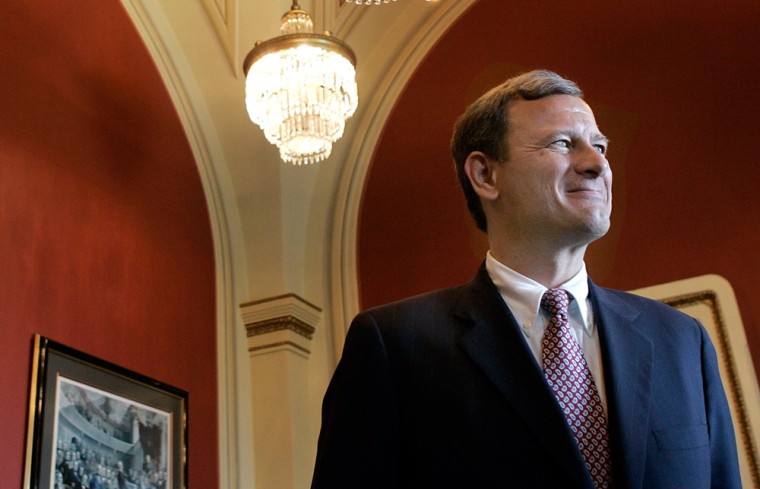In decisions about traffic stops, wartime prosecutions and even toads, John Roberts the appeals court judge has given a glimpse into how John Roberts the Supreme Court justice might act: deferential to police and the president, wary about government overreaching.
Roberts is a member of the Washington-based appeals court that sometimes is called the second most important court in the country because of the major issues it handles. But during his two years, Roberts has dealt mainly with less-than-glamorous subjects like fraud, regulatory disputes and law enforcement skirmishes.
President Bush’s pick to replace retiring Sandra Day O’Connor would immediately confront meaty issues on the highest court, although he will be questioned first about his record on the appeals court and as an attorney in the Reagan and George H.W. Bush administrations.
Roberts’ appeals court material is sparse, with about 40 majority opinions over two years. The latest two new Supreme Court justices — Stephen Breyer and Ruth Bader Ginsburg — had been on appeals courts more than a decade each and had written hundreds of decisions.
“He’s not revealing any agenda in his court of appeals opinions,” said Orin Kerr, a George Washington University law professor and former Supreme Court clerk.
Judging 4th Amendment freedoms
Andrew Levy, a Baltimore criminal lawyer who teaches at the University of Maryland, said, “It’s pretty dry technical stuff. It leaves people to reading the tea leaves like everyone else. I suspect the administration likes this just fine.”
There are some themes, however.
Roberts repeatedly has come down on the side of police, as when he ruled against a 12-year-old girl who had been arrested for eating a french fry on Washington’s subway system, and in several cases involving car stops and searches.
He was in dissent in a search case, decided Friday on a 2-1 vote. Over his objections, a panel found that U.S. Park Police did not have grounds to search a car trunk during a traffic stop though there was reason to believe the vehicle might be stolen.
As a Supreme Court justice he would repeatedly deal with questions about how far police can go without violating the Fourth Amendment ban on unreasonable searches or seizures.
“I wholeheartedly subscribe to the sentiments expressed in the concurring opinion about the Fourth Amendment’s place among our most prized freedoms. But sentiments do not decide cases; facts and the law do,” Roberts wrote in the dissent.
He said an experienced district judge concluded that there was enough suspicion to warrant probable cause for the search. “Right or wrong, nothing about that determination reflected insensitivity to constitutional values, any more than a contrary determination would have reflected insensitivity to the needs of law enforcement,” Roberts wrote.
Backing presidential authority
He has handled several cases brought by the Bush administration, and has backed presidential authority.
Last week he was part of a unanimous three-judge panel that cleared the way for the Pentagon to resume military trials for foreign detainees held in Cuba. A year ago, he voted to throw out a judgment for U.S. prisoners of war during the 1991 Gulf War, as the Bush administration wanted. He issued a dissent in a preliminary decision that went against the Bush administration’s efforts to keep secret records of the vice president’s energy task force.
The Roberts dissent that has been most closely dissected involved the power of the federal government to protect the environment. Roberts questioned whether the Endangered Species Act applied to a dispute over a California development and rare toads that reside only in that state.
Roberts did not endorse striking down the species act, but he questioned whether the Constitution’s commerce clause justified using it in a matter apparently limited to just one state.
Stephen Wermiel, an American University law professor, said Roberts “fits the conservative mold of judges who have concerns about how criminal procedure rulings may handicap law enforcement.”
And like Chief Justice William H. Rehnquist, for whom Roberts clerked, Roberts appears to have a “healthy respect for presidential power,” Wermiel said.
Sense of humor
Roberts has not sided with the government in every case. He backed a man who challenged his sentence for fraud, on grounds that the man was more of a bit player in the crime than his wife.
One thing very clear about Roberts is the humor he brings to his decision writing. He joked in Friday’s opinion that the driver may have lost his car registration and “sometimes dogs do eat homework.”
In his french fry arrest decision, he sided with authorities but found a lighter side: “The district court described the policies that led to her arrest as ’foolish,’ and indeed the policies were changed after those responsible endured the sort of publicity reserved for adults who make young girls cry.”
In the frog case, “the hapless toad,” he wrote, “for reasons of its own, lives its entire life in California.”
